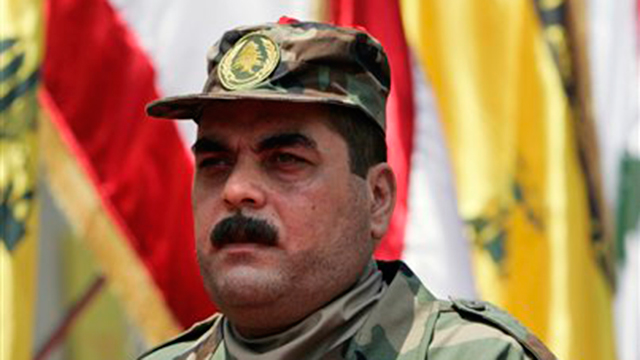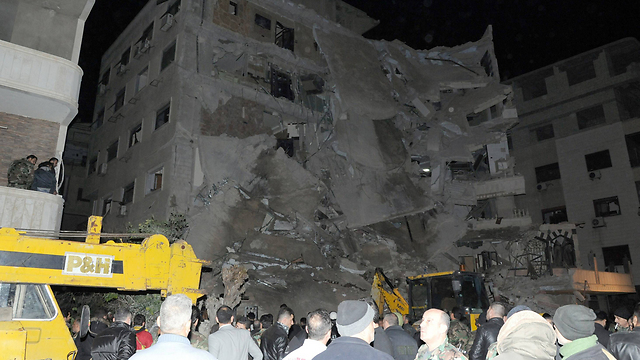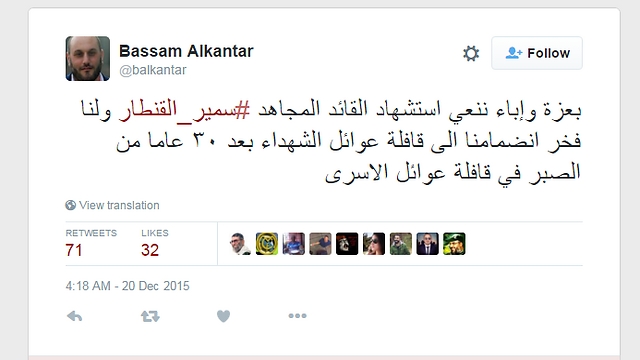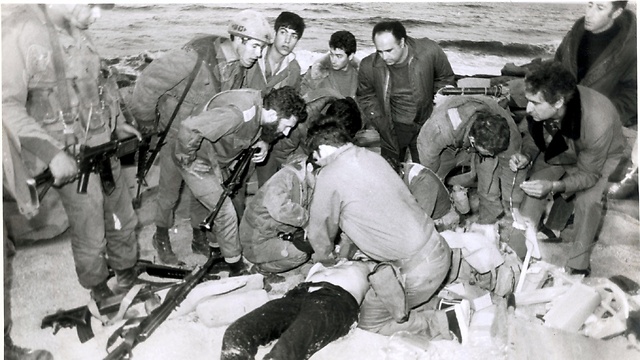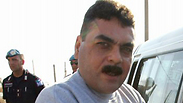
Hezbollah: Samir Kuntar, murderer of Haran family, killed in airstrike
Al Manar reports the senior Hezbollah leader was assassinated by the Israel Air Force on the outskirts of Damascus, 36 years after murdering the Haran family and police officer Eliyahu Shahar in Nahariya.
According to reports in the Arab media, eight others were killed in the attack, including Farhan al-Shaalan, another senior leader who planned terror attacks against Israelis in the Syrian Golan Heights.
"At 10:15pm on Saturday December 19, Zionist warplanes struck a residential building in Jaramana city in Damascus countryside. The Dean of liberated detainees from Israeli prisons, brother Mujahid Samir Kuntar was martyred along with several Syrian citizens in the strike," Hezbollah said in a statement.
The Syrian government released a condemnation of "the terror attack that led to the death of innocent civilians in Jaramana, including the warrior Samir Kuntar."
Israel welcomed his death, saying he had been preparing attacks on it from Syrian soil, but stopped short of confirming responsibility for the strike that killed him, as per its ambiguity policy.
Hezbollah's official media said Kuntar would be buried on Monday in a Shi'ite cemetery in its main stronghold of Dahiya in the southern suburbs of Beirut. The party, which mourned him, also opened a condolences hall to receive the public.
According to Hezbollah's mouthpiece Al-Manar, two IAF jets infiltrated Syrian airspace and launched four long-range missiles at a six-floor high building in Jaramana, on the southern outskirts of Damascus, destroying the building and causing damage to surrounding structures.
An Al-Manar reporter in Damascus said that Jaramana has been the site of many recent fights with rebel forces fighting to overthrow Syrian President Bashar Assad. The Lebanese network claimed the rebels provided Israel with the information on Kuntar's whereabouts.
Lebanon-based Al-Mayadeen TV said Kuntar had been living in the targeted building for a year. The station, which is close to the Syrian government and Hezbollah, said Kuntar and one of his aides were killed.
Alikhbaria, a mouthpiece of the Assad regime, reported that the relevant authorities are examining the remains of the missiles fired in order to determine their quality and destruction capabilities.
An hour after the reports in Arab media, Kuntar's brother Bassam confirmed Samir's death on Twitter: "With pride we announce the martyred death of the commander and jihad fighter Samir Kuntar. We are proud to join the ranks of the shahid families after 30 years of waiting among the ranks of the prisoners' families."
Syrian Information Minister Omran al Zubi said the authorities were investigating the attack but pointed the finger towards Israel, though he fell short of blaming it.
"The party that gains most from the assassination of Kuntar is the Zionist enemy whom we have long known for these cowardly attacks," Zubi told Hezbollah's Manar television station.
"Such acts of the Zionist regime (Israel), which have become a consistent method, are the most dangerous forms of state terrorism," Iranian Foreign Ministry spokesman Hossein Jaber Ansari was quoted as saying by Iran's ILNA news agency.
In 1979, when Kuntar was 16 years old, he infiltrated Israel on a rubber boat from Lebanon along with three other terrorists from the "Palestine Liberation Front." The four came ashore in Nahariya, shot dead police officer Eliyahu Shahar and broke into the apartment of the Haran family. There, they took Danny Haran and his four-year-old daughter Einat hostage, while mother Smadar hid in a crawl space with two-year-old daughter Yael.
Father Danny and daughter Einat were taken ashore, where a firefight ensued between the terrorists and police officers who arrived at the scene. Kuntar shot Danny Haran to death, and then cruelly smashed Einat's skull with the butt of his rifle, murdering her as well.
Two-year-old Yael was accidentally smothered to death while her mother was trying to stop her from crying and revealing their hiding place.
Another police officer was killed, along with two of Kuntar's cell members, in the gunfire that ensued.
Kuntar was jailed for almost 30 years, for which he was known in Lebanon as "The Dean of Lebanese Prisoners" for being the longest-held prisoner in Israel, and was freed in a prisoner exchange between Israel and Hezbollah in 2008, in return for the bodies of IDF soldiers Eldad Regev and Ehud Goldwasser.

Kuntar, 53, received a hero's welcome upon his return to Lebanon. Syrian President Assad awarded him the country's highest medal during a trip he made to Damascus that year.
Soon afterwards he joined Hezbollah, his role growing quietly within the group's ranks particularly following the group's involvement in the civil war in Syria in support of President Bashar Assad's forces.
Since then, Kuntar has played a central role in Hezbollah and Iran's efforts to build up terrorist infrastructure in the Golan Heights in order to launch attacks against Israel, with recent reports in the Gulf States claiming Kuntar was in charge of the "Syrian Hezbollah."
In 2014, Kuntar, who is a Druze himself, was reportedly involved in attempts to recruit the Druze in Syria - both in the Golan Heights and in other areas - for a Druze militia to fight for the Assad regime, but these efforts were unsuccessful. 120 members of the Shabiha, mostly Alawite groups of armed militias in support of Assad, were also reportedly part of that effort.
Syrian state media said Kuntar was involved in a major offensive launched earlier this year by the Syrian army and its allies near the Syrian Golan Heights in Quneitra near the Israeli border against rebels fighting to topple Assad.
Rebels in southern Syria also said Kuntar was present in battles this year to defend a Syrian air base near the Druze majority city of Sweida close to the border with Jordan that rebels sought to capture.
Kuntar, who does not appear in the media often, recently gave an interview to the Lebanese Al Mayadeen TV channel, which is affiliated with Hezbollah. There he claimed that "Israel gives a lot of aid to the militants, but they must not be too happy about that, because some of them will pay a very high price for it."
He was asked if he is worried of an attempt on his life, and answered that he was. "Even if they assassinate me or other resistance fighters, the Syrian resistance operation continues forward," he said.
Kuntar was put on the United States' terror blacklist in September 2015. "On his return to Lebanon, Kuntar was welcomed by Hezbollah, a US Department of State-designated Foreign Terrorist Organization, and he has since emerged as one of the group’s most visible and popular spokesmen. Since Kuntar’s return, he has also played an operational role, with the assistance of Iran and Syria, in building up Hezbollah's terrorist infrastructure in the Golan Heights," the State Department wrote in its decision.
In July 2014 it was reported that Mwafaq Badriya, believed to be Kuntar's "right hand man," was killed in a car bomb in the Syrian Golan. The Hezbollah-affiliated Al-Akhbar newspaper quoted officials who claimed "Mossad agents" killed Badriya. However, Syrian opposition officials claimed Badriya was killed in battles with rebel forces.
Reports about Israeli attacks in Syria appear in the Arab media every once in a while, and until recently, Israel remained silent about such reports. But earlier this month, Prime Minister Benjamin Netanyahu confirmed for the first time that Israel does indeed operate militarily in Syria.
"We're operating in Syria from time to time in order to stop the country from becoming a front against Israel," he said. "We're operating against another terror front that Iran is trying to build in the Golan, and in order to thwart the transfer of particularly deadly weapons from Syria to Lebanon. We will continue doing this."
Kuntar's killing, if indeed done by Israel, would mark the first Israeli assassination of a senior figure inside Syria since Russia launched its military operations in Syria on Sept. 30 in support of President Bashar Assad.
Defense Minister Moshe Ya'alon has said that Russia and Israel have worked out an open communication system "to prevent misunderstandings."
 |
The Associated Press and Reuters contributed to this report.










